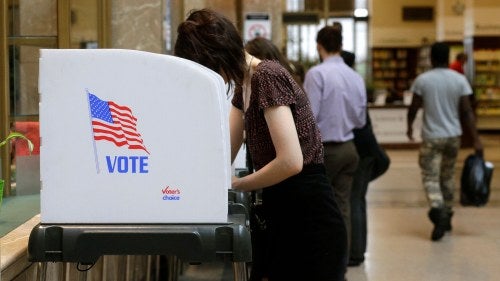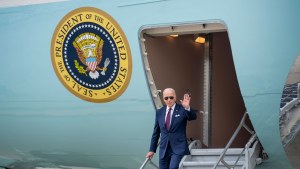Where "Pure Independents" Stand on US Foreign Policy

Independents who lean toward neither party could play a decisive role in the 2024 presidential election.
Recent pollsters and pundits have focused on the significance of Independent voters in the upcoming 2024 presidential election, particularly in battleground states. While much of the horse-race polling has shown a pretty close race for the last several months—with some advantage toward former President Donald Trump—surveys in recent weeks have reported particular shifts among Independent voters.
For example, a June 10–12 PBS/Marist poll among registered voters, conducted after Trump was convicted in Manhattan on 34 felony counts, showed a decline of 6 percentage points among Independents who prefer the former president compared to May. At the same time, the results showed a gain of 8 percentage points for current President Joe Biden among Independents, giving him a 2-percentage point edge among this group of voters. A June 14–17 Fox News survey also found an increase of 9 percentage points for Biden among Independents. And an earlier June 7–9 Politico-Ipsos poll found that 21 percent of Independents said they were less likely to support Trump after his conviction.
Independents are a sneaky bunch. While they may describe themselves as “Independents,” many of them tend to lean toward one party or the other. In the 2023 survey, 39 percent overall identified themselves as Independents, with 20 percent of Independents saying they lean Republican and 27 percent of Independents leaning toward the Democratic Party. That leaves 53 percent of Independents (21% of Americans overall) as “pure Independents,” leaning toward neither party.
While the nonpartisan Chicago Council on Global Affairs surveys do not focus on Americans’ electoral preferences, we do look at partisans’ foreign policy preferences to get a sense of the direction they would like their candidate of choice to take on international matters.
These pure Independents, under the microscope as a decisive factor for the 2024 vote, express policy preferences that are more akin to Republican than Democratic stances on many foreign policy issues. As the results of the 2023 Chicago Council Survey showed, the ongoing debate about the future of US foreign policy within the Republican Party has had a strong effect on the views of everyday Republicans, especially on issues of US global engagement (and assistance to Ukraine). For example, for the first time in 50 years of polling, a majority of Republicans (53%) said the United States should stay out of world affairs, compared to 29 percent of Democrats.
Independents who lean toward the Republican or Democratic parties tend to resemble their copartisans on the US role in the world: three-quarters of Democratic leaners (75%) favor an active role for the United States, compared to half of Republican leaners (50%). However, a majority of pure Independents favor the United States staying out of world affairs (57%; 42% active part), putting them much closer to Republicans than Democrats among the public. In addition, a majority of pure Independents say the costs of maintaining the US role in the world outweigh the benefits (54%, 44% benefits greater), and they are divided on whether the United States should continue sending military (49%) and economic (48%) aid to Ukraine.
This doesn’t mean that pure Independents are fully opposed to US international engagement: a majority think the United States should maintain its commitment to NATO (66%), as do 68 percent of Republicans and 92 percent of Democrats. But pure Independents are divided on whether to use US troops to defend a NATO ally like Germany (46% support, 51% oppose) or one of the Baltic NATO states (46% support, 53% oppose)—again, a view closer to Republicans than Democrats. And they are mostly opposed to using US troops to defend South Korea if it is invaded by North Korea (62% vs. 36% support).
In short, if any of these pure Independents choose to vote for Biden over Trump, it likely will not be due to the Democratic Party’s foreign policy platform. Then again, despite the wars in Gaza and Ukraine dominating the headlines, polls show that foreign policy is not expected to play a large role in the upcoming elections (with the exception of immigration). And on immigration, pure Independents don’t align clearly with either Republicans or Democrats, looking more like Republicans on legal immigration levels but more like Democrats on potential immigration reform and a path to legal status for undocumented immigrants.
Of course, there is one additional caveat: these pure Independents may not choose to vote for Biden, Trump, or anyone else. Pure Independents are less likely to say they are interested in following the national news (or the news about any other specific issue), and they are far more likely than other Americans to report not voting in 2020 (42%, and another 11% don’t remember).




Related Content
 US Foreign Policy
US Foreign Policy
Republicans with a somewhat favorable or unfavorable view of the former president are more likely to say US assistance to Kyiv has been worth the cost.
 Public Opinion
Public Opinion
Cleavages within the party could further complicate President Joe Biden's path to reelection.
 US Foreign Policy
US Foreign Policy
Republicans with very favorable views of Trump are more likely than other GOP backers to support deportations for undocumented immigrants.
 US Foreign Policy
US Foreign Policy
For the first time, a majority of Republicans think the United States should stay out of world affairs.